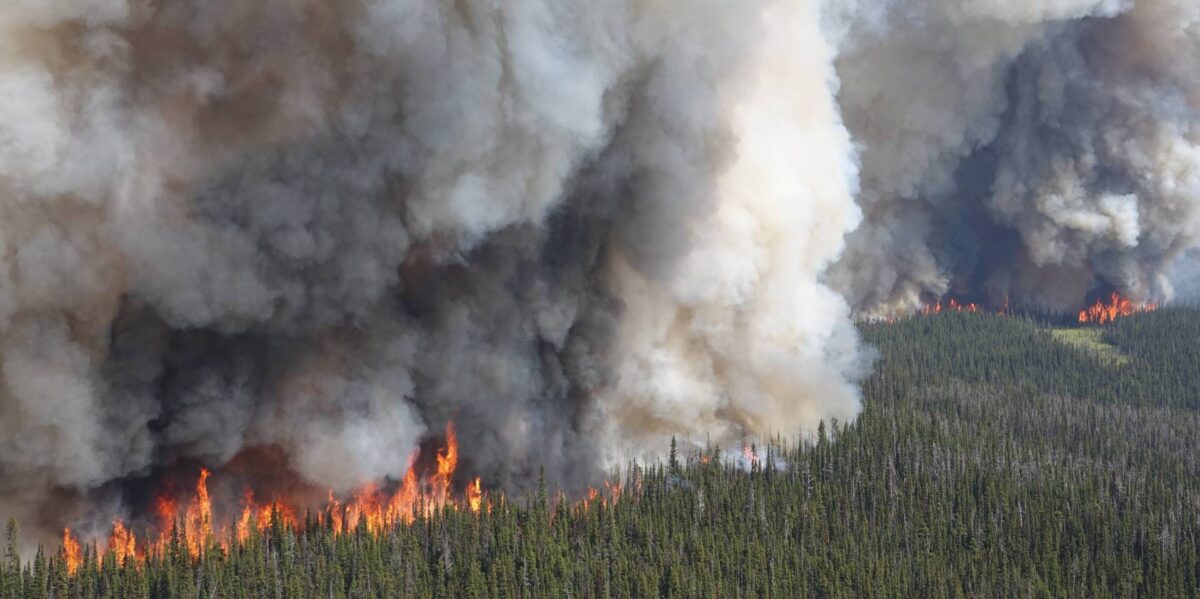According to EcoWatch, Canada’s wildfires emissions had already hit a record high for annual emissions in late June, less than six months into the year.
With over 111,000 square kilometres of land burned so far this year as of July 20, experts are calling it the worst wildfire season in not just Canadian, but North American history.
With 11 of the 13 provinces and territories reporting wildfires, thousands of square kilometres continue to burn each day.
Between Monday and Wednesday alone, 92 new wildfires were reported across the country. As of Wednesday, 4,285 fires have been reported throughout the 2023 Canadian wildfire season. Nearly 900 of them are active and nearly two-thirds remain out of control.
The fires have resulted in reduced air quality across much of the country, spreading to the United States and Europe.
In a briefing earlier this month, Michael Norton, director general of the Canadian Forest Service’s Northern Forestry Centre, noted that more than 155,000 Canadians have been evacuated from their homes due to the threat of wildfire activity.
Canada’s historic wildfire season, by the numbers
The amount of land that has burned is about the size of Kentucky, and double the size of Nova Scotia, where one million people call home.
Nova Scotia experienced the largest wildfire in the province’s history in June, when a Shelburne County wildfire resulted in 23,000 hectares of land being burned and about 35 structures being burned.
But the massive wildfire was not the only one first responders were fighting in the province. A fire in the Halifax suburb of Tantallon resulted in more than 150 homes and about 50 other structures being lost and an estimated $165 million in insured damages.
According to the Insurance Bureau of Canada, insured damages related to extreme weather events totaled $3.1 billion in 2022 alone, with the yearly average now regularly above $2 billion.
Of the active wildfires, nearly 400 are burning in British Columbia, another province experiencing its most devastating wildfire season on record.
Cost of ‘carbon tax’ pales in comparison to cost of climate crisis
As the country burns, Conservatives are calling for the federal government to eliminate carbon-pricing programs implemented in provinces where premiers failed to create an alternative that meets federal requirements.
On July 1, the four Atlantic provinces saw the implementation of the carbon-pricing program, followed days later with further clean fuel regulations.
But as drivers complain about the added cost of fuel — which can be offset by the quarterly Climate Action Incentive rebate paid back to Canadians — they fail to see that the cost of climate change will have a much bigger impact not just on their wallets, but their quality of life.
The Canadian Climate Institute warns that by 2025, the effects of climate change are expected to cost Canadians a total of $25 billion, with the number expected to continue rising year-over-year.
Even the federal Minister of Health, Jean-Yves Duclos, has called the climate crisis “the single biggest threat to human health.”
Health inequities and the climate crisis
In a 2022 interview with rabble.ca, Dr. Melissa Lem stressed the connection between health inequities and the climate crisis.
Lem, the president of the Canadian Association of Physicians for the Environment, stressed the need for health-care workers to look at social and ecological determinants of health — clean air, safe drinking water, food security and permanent housing — when treating patients, as most health effects of climate change, she says, are out of people’s control.
“One of the huge injustices of climate change is that it disproportionately affects people whose health status is already worse,” she explained at the time. “In many cases, these are people who have done very little to actually cause climate change.”
In March 2022, rabble.ca reported on research by the UN Intergovernmental Panel on Climate Change (IPCC) — their first-ever study into climate effects on mental health.
Among the three pathways found by the IPCC include the economic and physical injuries that could cause mental health issues after surviving a natural disaster.
Others looked at the moral injury of watching loved ones suffer from effects of the climate crisis, as well as the growing “climate anxiety” among young people who fear for their futures.
Now, as the globe continues to break heat records dating back more than 125 centuries, wildfire seasons are likely to get longer.
The World Health Organization (WHO) warns that 250,000 unnecessary deaths will occur between 2030 and 2050 due to malnutrition, malaria, diarrhea and heat stress related to climate change.
Firefighters are going to experience burnout, not to mention catastrophic losses of their own.
Checking air quality indexes will become a part of daily life for millions of people, much like masking to avoid respiratory issues from prolonged exposure to wildfire smoke.
But the scenario that seems too terrifying to address is really quite simple: What happens when the power goes out and the air conditioner shuts off? When the generator does not turn on and the ventilation systems are rendered moot. When there’s no relief, or the illusion of one?
We cannot afford to find out.



